 |
 |
 |
 |
 |
 |
|
|
||||
|
Contributors |
|||
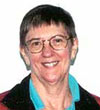 |
I am basically a teacher – whether it be in the classroom, or writing for students or teachers, running workshops for teachers and teacher trainers, or consulting in science or in English as a second language. I have had the privilege of working and writing in the UK, Ghana, the USA, Jamaica and other countries in the Caribbean, and, more recently, for part of each year in New Zealand. My first-degree work was in science, followed by a teaching diploma that convinced me that I preferred education to research. After teaching in the UK, I lived in Ghana for nine years where my three daughters were born. I also wrote my first book during this time – four degrees off the equator sitting at a student desk on weekend mornings, and in the evenings at home while being bitten by mosquitoes. I did my own drawings and wrote the labels and text, giving in camera-ready copy to a rather surprised publisher. The book Tropical Biological Drawings was reprinted, untouched, for nearly 30 years before the second edition was published by Macmillan. From Ghana, we went to the USA where I completed my PhD in Science Education and was also able to expand my interest in the teaching of language and mathematics. Our whole family 'went to school': we had homework in the evenings and helped with the washing and cleaning at the weekends. Our next country was Jamaica, where we lived for 11 years. I worked at the Ministry of Education in teacher training, curriculum development, and planning and evaluation at primary level; and in science at secondary level. Our three children continued their patchwork school lives in a variety of countries, eventually becoming PhD scientists – now working in the UK, Jamaica and Denmark. After the Caribbean, I returned to the UK and, for the past 20 years, have been self-employed with a mixture of writing and consulting work. I regularly travel to the Caribbean for workshops, and to New Zealand where my second husband was born. Writing has certain advantages: you can do your own planning and checking, and can venture into new areas and develop expertise. But is a very unstructured life and you need self-discipline and the ability to plan and stick to your own deadlines. Consulting work, on the other hand, is more structured, and draws on expertise you already possess. It also involves fitting into the plans and deadlines of others, but with the added advantage of interaction with professionals from different areas. Most of my writing has been for Caribbean and African countries, and for New Zealand, although I have written three books for UK Biology at GCSE level. I write under both of my married names, Mitchelmore and Hassall, which sometimes causes confusion! One of my most memorable books is a Primary Science revision book, Ke Pu Ke Tang, published in China as a revision of Let's Pass Science. I have also had the exciting experience of visiting China at the invitation of the Educational Research Institute in Beijing to run a week's workshop based on using process skills in primary science for 120 teacher trainers from 31 of the 32 provinces of the People's Republic of China. During my career I have written well over 100 books for over 30 countries. I began writing biology and science books for secondary level. Then I became interested in primary science and prepared full series for students and teachers in the Caribbean and in New Zealand. At workshops in the Caribbean, some teachers voiced concern over the poor reading skills of their children – which prompted me to go into primary language. I have now completed a series on teaching children to read, from basic readiness skills to full use of words, with an emphasis on phonics and a very structured 'scientist looks at language' approach. This I followed with another series for developing language mastery as a fun way to present grammar: my books present a magical 'Land of Sentences' where the words grow on trees and various characters make them into sentences, under the watchful eye of the 'Sentence Controller'. I have also extended my abiding interest in words – how they behave and how to explain what they mean. This has led me to work on my own dictionary for primary and lower secondary level for the Caribbean, and to my interest and involvement in the Macmillan School Dictionary. I am resident in the UK. But having said that, my office
is wherever I happen to be. I began this article, for example, in Fiji,
en route from New Zealand to Los Angeles on our return from a southern-hemisphere
summer. With my laptop, portable printer, various cables and adapters,
I can download files and pdfs, and deal with emails and faxes, wherever
I am. It is indeed an interesting way to live. |
|||
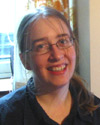 |
I first became interested in learner dictionaries more than 10 years ago while teaching English in Lithuania. I became a lexicographer with Cambridge University Press in 1999 and since then I have been involved in several ELT publications including Cambridge Advanced Learner's Dictionary, Cambridge Learner's Dictionary, the CD-ROM versions of the Macmillan English Dictionary and Macmillan Essential Dictionary as well as the Macmillan Schools Dictionary website. I have contributed to several websites – writing articles, designing web pages as well as adapting and creating interactive activities and games. I work from my home in Perthshire and most of my spare time is taken up with my baby son Aonghas (Gaelic for 'Angus') and walking my parents' border collie, Misty. |
|||
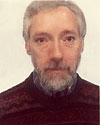 |
I come from Leeds. I did my first degree at the University of Cambridge, and then a Postgraduate Certificate in Education, during which I quickly abandoned my ambition to teach children in the UK state system. But at the end of that year I got a summer job teaching English as a foreign language to adults, found that I liked it, and I've never looked back since. I've lived in Poland since 1991. I live in As well as Inside Teaching (Macmillan), I'm co-author of The Pronunciation Book (Longman), one of the authors of Bridges (Klett) — an adult course for German-speaking learners — and the PONS Polish-English Dictionary (LektorKlett). At the moment I'm working on pronunciation materials for Polish and international readerships, and starting work on another Polish-English dictionary. I like studying languages and tracing connections between them, and I'm — still — intrigued by the question: Given that so many people in the world learn foreign and second languages informally, without books, teachers and so on, how can formal instruction help most effectively, as opposed to interfering with the learning process? I'm also keen on walking, travelling by train, photography, history, architecture, landscape, folklore and so on. I spend an enormous amount of time listening to music, and if I get reincarnated I want to be a musician next time round. |
|||
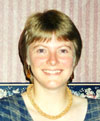 |
Kerry has a first degree in computational linguistics and an MA in theoretical linguistics from the University of Manchester, specialising in syntactic theory. For several years she worked as a researcher at Manchester and Essex universities, where in connection with European projects on machine translation, she was involved in computational lexicography, co-ordinating research in computational descriptions of compounds and collocations, and presenting her work in various international academic contexts. In 1993 she joined Cambridge University Press as a lexicographer/editor and grammar consultant, and worked on a large number of Cambridge learners’ dictionaries, including the English Pronouncing Dictionary, the Cambridge International Dictionary of Phrasal Verbs and the Cambridge Learner’s Dictionary in print and CD-ROM versions. In June 2001 Kerry moved to York where she now works as a freelance editor/lexicographer and is involved in a range of dictionary and grammar projects. |
|||
| Meet the Editor | ||||
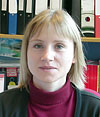 |
Kati
Sule
I come from Hungary. I studied English Language and Literature at the University of Szeged in south-east Hungary where I also completed an English Language Teaching degree. I taught English as a foreign language in Hungary and in the Netherlands. I am Managing Editor of the Macmillan Dictionaries series and was editor of the Macmillan English Dictionary Workbook. I am also one of the editors of the Macmillan English Dictionaries resource site. I live in Amsterdam and frequently travel to the UK. I'm a keen but rather lazy runner. In my free time I enjoy playing squash, watching films and reading. |
|||
| Cover photographs
© ImageState Royalty Free/Alamy (feature); cover photo courtesy of
www.SCOTTeVEST.com (new words) Cover design by Mairi MacDonald |
||||
|
|
||||